THE LIVING TAO : TIMELESS WISDOM FOR THE MODERN WORLD
This is a podcast dedicated to exploring the profound, yet elusive True Tao (真道). Acknowledging that the essence of Tao is beyond traditional discourse and expression, this series seeks to demystify Taoist principles and adapt them for contemporary listeners. Each episode offers a blend of ancient wisdom and modern insights, providing practical guidance for navigating the complexities of today’s world. Whether you’re a seasoned practitioner or new to the path, join us in discovering how the timeless wisdom of Tao can be lived out in the here and now.
Episodes
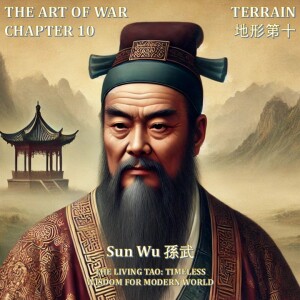
Sunday Dec 01, 2024
Sunday Dec 01, 2024
Sun Tzu's Art of War, Chapter 10, emphasizes the crucial role of terrain in military strategy. Six types of terrain are defined—accessible, entangling, supporting, constricted, precipitous, and distant—each demanding a unique tactical approach. The text also details six common military failures stemming from poor leadership, not unfavorable conditions. Ultimately, success hinges on a general's understanding of terrain, enemy capabilities, and their own troops' strengths, coupled with prioritizing the welfare of the people.
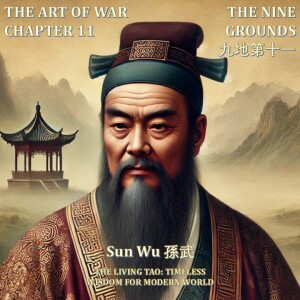
Sunday Dec 01, 2024
Sunday Dec 01, 2024
Sun Tzu's Art of War, Chapter 11, classifies nine types of terrain—dispersive, light, contentious, intersecting, focal, heavy, difficult, encircled, and deadly—detailing appropriate military strategies for each. The text emphasizes adapting tactics to the specific challenges and opportunities presented by the terrain, stressing the importance of understanding the enemy's strengths and weaknesses, as well as the psychological factors affecting troop morale and effectiveness. Successful commanders exploit terrain to achieve surprise, maintain unity, and manipulate the enemy's actions, ultimately securing victory through careful planning and decisive action. The text uses analogies, such as the "Shuai Ran" snake and the cooperative efforts of enemies in shared peril, to illustrate key principles of strategic coordination and decisive action.
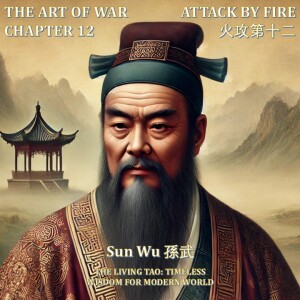
Sunday Dec 01, 2024
Sunday Dec 01, 2024
Sun Tzu's Art of War, Chapter 12, details the strategic use of fire in warfare. Five types of fire attacks are described, targeting personnel, supplies, transport, arsenals, and formations. Success hinges on timing and preparation, considering weather, wind (predicted by constellations), and the enemy's response. Sun Tzu emphasizes adaptability and strategic restraint, warning against emotional decisions and highlighting the importance of consolidating gains to secure victory and protect the state.
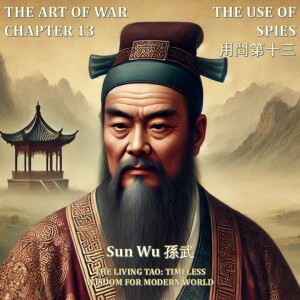
Sunday Dec 01, 2024
Sunday Dec 01, 2024
Sun Tzu's Art of War, Chapter 13, emphasizes the crucial role of espionage in warfare. It details five types of spies—local, internal, double, doomed, and living—and stresses the importance of their coordinated use for achieving victory. The chapter highlights the immense cost of war and condemns neglecting intelligence gathering as inhumane and irresponsible. Success hinges on superior knowledge of the enemy, obtained through skillful and subtle use of spies, emphasizing the need for discretion and rewarding loyalty. Historical examples underscore the effectiveness of this strategy.
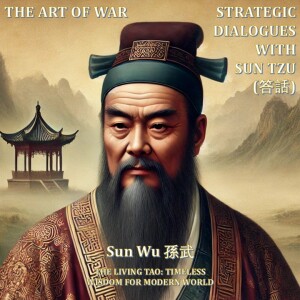
Sunday Dec 01, 2024
Sunday Dec 01, 2024
This Podcast presents a dialogue between the Wu King and Sun Tzu (along with Wu Zixu in some sections), exploring various military strategies and leadership principles within the context of The Art of War. The dialogue covers diverse battlefield scenarios, emphasizing adaptability, psychological warfare, and the importance of seizing opportunities. Sun Tzu's responses detail tactical maneuvers and leadership qualities, including wisdom, benevolence, and discipline, crucial for victory. Additional excerpts offer further insights into Sun Tzu's strategic thinking, including omens and the necessity of civil governance alongside military strength. Finally, the text notes that some included works are later interpretations inspired by Sun Tzu's principles, not directly authored by him.
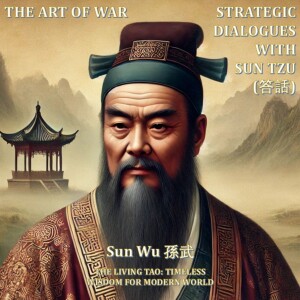
Sunday Dec 01, 2024
Sunday Dec 01, 2024
Sun Tzu's Art of War is an ancient Chinese military treatise, written around 512 BCE, that explores key aspects of warfare. The thirteen chapters cover strategic planning, battlefield tactics, and philosophical principles, emphasizing caution, complete victory, and proactive preparation. Its profound influence on military thought is evident in its enduring legacy and widespread translation. The text integrates military strategy with philosophical concepts such as Taiji, highlighting the importance of adaptability and understanding the interplay of opposing forces. Its enduring relevance stems from its timeless wisdom concerning strategic calculation and the pursuit of victory.
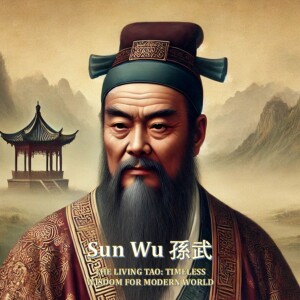
Sunday Dec 01, 2024
Sunday Dec 01, 2024
Sun Tzu, a Chinese military strategist, philosopher, and politician of the Spring and Autumn period, is the focus of these texts. They detail his life, including his rise to prominence in the State of Wu, his military campaigns, and his authorship of The Art of War. The excerpts also explore Sun Tzu's key military doctrines, emphasizing strategy, intelligence, adaptability, and the importance of knowing both oneself and one's enemy. His profound impact on military thinking and his lasting legacy are highlighted, showcasing his enduring influence on both military and broader societal strategy. Finally, the texts trace his ancestry and career, providing context for his achievements.
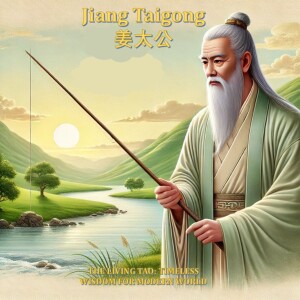
Saturday Dec 07, 2024
Saturday Dec 07, 2024
Jiang Taigong, a pivotal figure in ancient Chinese history, is the subject of these texts. Details of his life, including debated birthplaces and his multifaceted roles as military strategist, statesman, and advisor to four Zhou kings, are explored. His contributions to the establishment of the Western Zhou dynasty, particularly his crucial role in the Battle of Muye, are highlighted. The texts also discuss his enduring legacy, encompassing military strategy, political thought, and cultural influence, and his posthumous veneration. Finally, folklore and legends surrounding Jiang Taigong, such as the famous “fishing” anecdote, are examined.
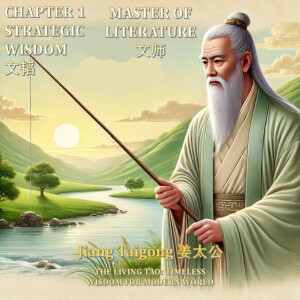
Saturday Dec 07, 2024
Saturday Dec 07, 2024
The Chapter is primarily an excerpt from The Art of War by Master Taigong, a text traditionally attributed to Jiang Taigong but likely originating later, during the Warring States period. The excerpt details dialogues between Taigong and Kings Wen and Wu, exploring themes of leadership, governance, and military strategy. Taigong's teachings emphasize the importance of understanding human nature, utilizing resources wisely, and employing deceptive tactics in warfare. A secondary source provides context, describing the book's structure and suggesting its later composition based on linguistic style and technological references.
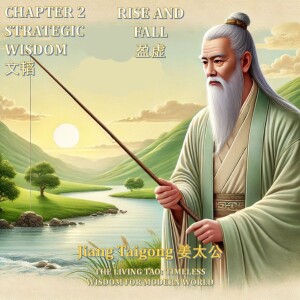
Saturday Dec 07, 2024
Saturday Dec 07, 2024
The Chapter is an excerpt from The Art of War by Master Taigong, specifically Chapter 2 ("Strategic Wisdom - Rise and Fall"). This chapter features a dialogue between King Wen and Taigong Wang, exploring the factors influencing societal prosperity and decline. Taigong Wang emphasizes the crucial role of a virtuous ruler, using the governance of Emperor Yao as a prime example of benevolent leadership characterized by simplicity, justice, and care for the people. The excerpt also includes background information on the text itself, suggesting it may not originate from the early Zhou Dynasty as traditionally attributed, but rather from the Warring States period due to its stylistic and contextual elements. Finally, a brief overview of the book's six sections is given, each focusing on different aspects of civil and military strategy.

The Living Tao
Welcome to The Living Tao: Timeless Wisdom for the Modern World—your guide to living a life of balance, wisdom, and inner peace. Inspired by the profound teachings of ancient masters, this podcast explores the enduring relevance of these timeless insights in today’s fast-paced world.
Taoist teachings emphasize living in harmony with the natural flow of life—the Tao, or "the Way." This philosophy invites us to embrace simplicity, cultivate humility, and find peace by aligning ourselves with the rhythms of the universe. At its heart, Taoism encourages us to let go of resistance, shed the distractions of ego, and discover the profound serenity that comes from living authentically and in tune with our true nature.
The Tao Te Ching, attributed to Laozi, is one of the most influential texts in Taoism and serves as a cornerstone of our discussions. Its poetic verses guide us to reflect on themes like balance, self-awareness, and effortless action, or wu wei. These teachings are not bound by time or culture—they resonate just as powerfully today, offering insights that help us navigate the complexities of modern life with grace and equanimity.
Each episode of The Living Tao will uncover practical wisdom rooted in these ancient teachings, presenting it in ways that are both accessible and transformative. Whether it's understanding the art of stillness in a world of constant movement, finding clarity amid chaos, or exploring the paradoxes of strength through softness, you’ll discover tools and perspectives to enrich your life and deepen your connection to the world around you.
Whether you're a seasoned practitioner familiar with the Taoist path or a newcomer drawn to its gentle yet profound philosophy, this podcast offers something for everyone. Together, we'll explore how these age-old principles can help us embrace change, cultivate mindfulness, and find a sense of purpose and inner peace in the face of life's challenges.
Join us on this journey of self-discovery, as we bring the wisdom of the Tao into the present moment. Let the timeless truths of this ancient tradition inspire and empower you to live a more harmonious and enlightened life. Tune in, reflect, and allow the teachings of The Living Tao to guide you back to the essence of who you are.








